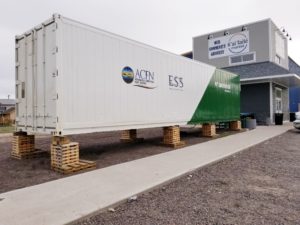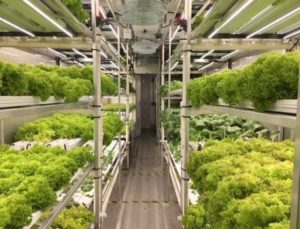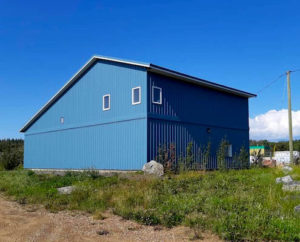Sustainable Food Centre
 Fort Chipewyan is investing in local food production projects. By growing food locally, this remote community will continue with the community’s efforts to deliver on indigenous-owned clean energy, healthy food and sustainable economic development.
Fort Chipewyan is investing in local food production projects. By growing food locally, this remote community will continue with the community’s efforts to deliver on indigenous-owned clean energy, healthy food and sustainable economic development.
The FIRST STAGE of local food production is ACFN’s high tech indoor farming system. Using a container, this Growcer unit is a self-contained, year round hydroponic farm that resides beside the K’ai Tailé Market.
The Growcer is a state-of-the-art container farming system using hydroponics (growing food without soil) and it allows the community to grow fresh produce year round in a climate-controlled environment.
The advantage of growing things hydroponically is:
- Plants get what they need more easily and grow faster
- Plants need much smaller root systems so more energy goes into leaf and stem growth
- With smaller roots, you can grow more plants in the same area – even stacking them up
- This method works in all climates
- Hydroponics uses much less water than traditional gardening
- Automated systems make the work easier
For more information on what hydroponics is and how it works, check out the LEARNING PAGE.

For the SECOND STAGE, Three Nations Energy intends to design and construct a Sustainable Food Production Centre (SFPC). This project will utilize the existing Commercial Fish Plant and the surrounding lands. With direction from both the ACFN and MCFN Community Energy Plans, this 3NE project intends to reduce dependence on imported food and increase locally-grown food for the community of Fort Chipewyan.
Core components of the Sustainable Food Production Centre (SFPC) will include:
- Indoor Farming using a ‘Sea-Can’ Self-Contained Unit
- These hydroponics units will be used primarily to grow leafy greens and herbs
- Indoor Farming using the retired Fish Plant
- Hydroponics and Aquaponics (raising fish to provide nutrients to plants) systems to grow produce, such as leafy greens and some fruiting crops such as strawberries or tomatoes
- Seasonal Greenhouse to grow plants in soil beds ((flowers, garden landscaping and vegetable starter plants) for sale to community members, and for some fruits and vegetables that are not well suited to hydroponics production
- Self-Serve Food Processing to clean and process fresh or preserved wild foods
- Community Garden Plots
- Building on the existing community garden program for a more intensive raised-bed configuration
- Composting Facility
- Composting of organic waste from commercial, institutional, and residential sources in the community
- On-site Renewable Electricity Supply
- Solar array to generate 50-60kW for the facility
- On-Site Renewable Heating Supply
- Local wood heating supply using an outdoor wood-fired boiler for space heating
- Educational and Interpretive Elements